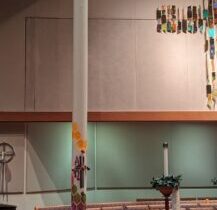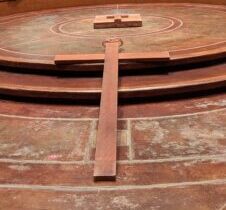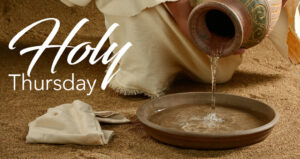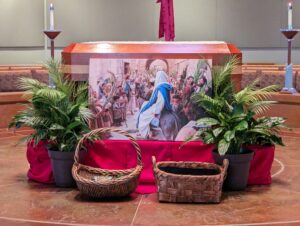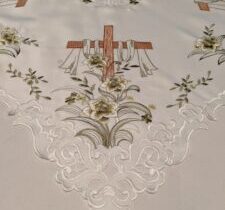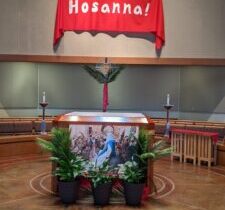My God, Why Have You Abandoned Me?
 A haunting Psalm from thousands of years ago is running through my head as we enter into Holy Week, 2025.
A haunting Psalm from thousands of years ago is running through my head as we enter into Holy Week, 2025.
Psalm 22 begins with a cry of anguish: “My God, my God, why have you abandoned me, far from my prayer, from the words of my cry?” Jesus prayed this psalm as he was dying on the cross. It sounds like a cry of despair, a hopeless acknowledgement of a dream demolished and a promise betrayed by an impotent or uncaring divinity. But was it really so?
The one who first sang this prayer spoke of being mocked and abused. “All who see me scoff at me.. He relied on the Lord; let him deliver him… They have pierced my hands and my feet … they divide my garments among them…”
Yet the prayer continues: “O Lord, be not far from me; O my help, hasten to aid me.” The one who is suffering does not lose hope. “I will proclaim your name to my brethren; in the midst of the assembly I will praise you: ‘You who fear the Lord, praise him; all you descendants of Jocob, give glory…’” (Ps 22:8-9, 17-18, 19-20, 23-24).
Jesus prayed this psalm as he was dying on the cross – abandoned by many of his friends, mocked, stripped of his clothing, tortured, humiliated. We remember and mourn. Yet, knowing the “end of the story,” the Resurrection, we sometimes forget that as a human being, a carpenter from Nazareth, he didn’t know it would all end in triumph for him. He was dying. It was the end for him. His life as a regular guy, even as a teacher and prophet and miracle-worker, was ending. Still, he prayed a psalm of hope.
The other readings for Palm Sunday of the Lord’s Passion tell of his triumphal entry into Jerusalem a few days earlier, hailed as a prophet, the king coming in the name of the Lord, bringing peace in heaven and glory on high. In just a few short days, it all ended in pain and death – his friends and followers scattered and mourning. (Lk 19:28-40)
We hear St. Luke tell of the Last Supper and institution of the Eucharist. We hear of the time of prayer in the garden on the Mount of Olives, the arrest of Jesus, his trial, and his crucifixion and death. We even hear of the gift of a tomb from Joseph of Arimathea, a member of the council that had condemned him. (Lk 22:14—23:56)
We are reminded of the prophecy of Isaiah about the one who would come in the Lord’s name and endure opposition, beatings, the mocking words and actions of opponents, but who would continue in faithful proclamation of the Lord’s words to rouse the weary and give hope to the oppressed. (Is 50:4-7)
We hear the ancient hymn quoted by St. Paul in his letter to the Philippians, reminding all that Christ Jesus emptied himself to become totally one of us, following the will of the Father. Through this obedience, God exalted him and gave him “the name which is above every name, that at the name of Jesus every knee should bend … and every tongue confess that Jesus Christ is Lord…” (Phil 2:6-11)
Still, I continue to hear the haunting refrain. “My God, my God, why have you abandoned me?”
I see the images in my mind of the men who were swept up recently by the immigration service and shipped, against the orders of the court, to a prison in El Salvador. There they are being treated as less than human, worse than we allow animals to be treated here. If they are crying, “My God, my God, why have you abandoned me?” it is with reason. Why have they been abandoned. Why are they being treated this way? Why have they not been returned to this country – to be allowed their right to legal counsel and judgement? Why are those with permission to be in the United States not returned already? They are all human beings, regardless of their legal status. Made in the image and likeness of God. Jesus is there with them in their suffering, because that’s where he goes, whenever people are suffering. He is suffering with them.
I hear the cries of those losing visas and being deported because they spoke out about wars being waged in other countries; wars that are disproportionate to the initial actions that triggered them.
I know the fears of people whose access to basic human services, including health care, food, shelter, and education are being threatened or denied because of indiscriminate cuts in funding.
“My God, my God, why have you abandoned me?”
And what to do?
Writing letters, calling representatives, speaking among ourselves and sharing information are all important responses. Remember, we are the People of God, the ones called to reach out and help those who are in need or being harmed by the unjust actions of others.
It can seem overwhelming. What can one person do? How can I change national policy?
But there are things one person can do, and many of them involve finding and working with others who are trying to help.
- Check your local faith community. What is being done to help migrants, refugees, and asylum seekers? What are organizations such as Catholic Charities doing? How can you help/join these groups in their mission? Do they have the “red cards” that contain information about the rights of everyone present in this country – in both English and Spanish? If so, get some and share them where you go. Are there non-institutional groups of folks who are helping “new neighbors?” Find or start one, then offer concrete help.
- Remember, always keep the identities of those with whom you are working protected. Many who have followed all the rules for seeking asylum are finding that’s not enough. You don’t want to be the one whose actions call attention to them and cause them to be harmed.
- Raise money to pay lawyers. Getting asylum and work permits involves filling out legal documents and getting favorable judgements in immigration court. Those who come fleeing persecution, wars, or gangs that are threatening their lives don’t always have a lot of education or money with which to hire lawyers. Many don’t speak English.
- Share food. If you have garden space, grow vegetables and share them with those who don’t know where their next meal will come from. If there are local groups who collect and share food, get involved and help out. Most of them will even help you harvest fruit from trees in your yard that otherwise would go to waste.
- Be a friend to those you meet. Offer a smile, a friendly face, a hand when needed. Help them find places to live, school for their children, clothing, and healthcare.
Voices of the suffering are still calling to us this Holy Week. The Lord is calling us to respond to their cries, “My God, my God, why have you abandoned me?” The Lord responds, “I haven’t abandoned you. I am reaching out to you through my sister (insert your name here) and my brother (your turn here, Guys!)”
May we be faithful friends of Jesus this week and through the weeks to come. Walking with our sisters and brothers, through these difficult days. Helping in the way best suited to the gifts we have.
Let us pray for those in need, those in danger, and those who feel content and secure in their opinions of the righteousness of the detentions. May we come to see, respect, and share in the Lord’s work of serving and comforting all in need.
Holy Week blessings be with you.
Readings for Palm Sunday of the Lord’s Passion – Cycle C
Read More







